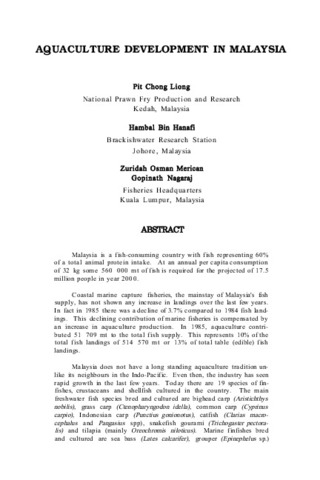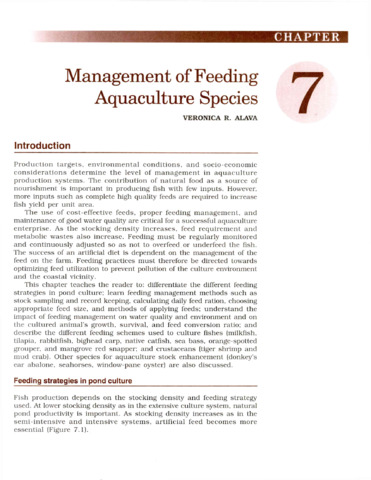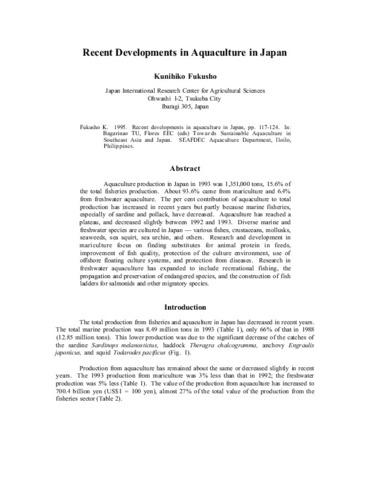Aquaculture development in Thailand
| dc.contributor.author | Sirikul, Boonsong | |
| dc.contributor.author | Luanprida, Somsak | |
| dc.contributor.author | Chaiyakam, Kanit | |
| dc.contributor.author | Sriprasert, Revadee | |
| dc.contributor.editor | Juario, Jesus V. | |
| dc.contributor.editor | Benitez, Lita V. | |
| dc.date.accessioned | 2011-06-06T02:34:00Z | |
| dc.date.available | 2011-06-06T02:34:00Z | |
| dc.date.issued | 1988 | |
| dc.identifier.citation | Sirikul, B., Luanprida, S., Chaiyakam, K., Sriprasert, R. (1988). Aquaculture development in Thailand. In J. V. Juario & L. V. Benitez (Eds.), Perspectives in Aquaculture Development in Southeast Asia and Japan: Contributions of the SEAFDEC Aquaculture Department. Proceedings of the Seminar on Aquaculture Development in Southeast Asia, 8-12 September 1987, Iloilo City, Philippines. (pp. 129-148). Tigbauan, Iloilo, Philippines: Aquaculture Department, Southeast Asian Fisheries Development Center. | en |
| dc.identifier.isbn | 971851113X | |
| dc.identifier.uri | http://hdl.handle.net/10862/143 | |
| dc.description.abstract | Aquaculture practised in Thailand is in the form of pond culture and cage culture in freshwater, brackishwater and coastal areas. The main species cultured include freshwater prawns, brackishwater shrimp, cockles, mussels, and various freshwater and marine finfishes. There is good potential for increased production from freshwater, brackishwater and marine aquaculture. However, the 1983 production of 145 000 mt represents only about 6% of Thailand's total fish production and production in this subsector has fluctuated widely. It will be several years before aquaculture production will contribute substantially to total production. Nonetheless, the culture of high value species of shrimp and fish could contribute significantly to export earnings during the next 5 to 10 years. Conducted primarily by government agencies, research and development are along the lines of increasing seed supply, establishing new culture techniques or improving older ones. The Department of Fisheries (DOF) together with some private companies have ventured into the development and testing of artificial diets for the various cultured species using a variety of indigenous feed stuffs. It is estimated that with adequate investments and appropriate support, aquaculture production will increase from 145 000 mt in 1983 to 378 000 mt in 1991, showing an annual increase of about 13% over this period. Major increases would come from bivalve mariculture (131 000 mt), brackishwater ponds (36 000 mt) freshwater ponds (46 000 mt) and brackishwater cage culture (20 000 mt). | en |
| dc.language.iso | en | en |
| dc.publisher | Aquaculture Department, Southeast Asian Fisheries Development Center | en |
| dc.subject | Anadara nodifera | |
| dc.subject | Macrobrachium | en |
| dc.subject | Porphyra | en |
| dc.subject | Penaeus | en |
| dc.subject | Gracilaria | en |
| dc.subject | Thailand | en |
| dc.title | Aquaculture development in Thailand | en |
| dc.type | Conference paper | en |
| dc.citation.spage | 129 | |
| dc.citation.epage | 148 | |
| dc.citation.conferenceTitle | Seminar on Aquaculture Development in Southeast Asia, 8-12 September 1987, Iloilo City, Philippines | en |
| dc.subject.asfa | seed (aquaculture) | en |
| dc.subject.asfa | shrimp culture | en |
| dc.subject.asfa | feeds | en |
| dc.subject.asfa | pond culture | en |
| dc.subject.asfa | mollusc culture | en |
| dc.subject.asfa | mussel culture | en |
| dc.subject.asfa | seed production | en |
| dc.subject.asfa | prawn culture | en |
| dc.subject.asfa | oyster culture | en |
| dc.subject.asfa | freshwater fishes | en |
| dc.subject.asfa | aquaculture | en |
| dc.subject.asfa | artificial feeding | en |
| dc.subject.asfa | brackishwater aquaculture | en |
| dc.subject.asfa | aquaculture systems | en |
| dc.subject.asfa | clam culture | en |
| dc.subject.asfa | feed composition | en |
| dc.subject.asfa | marine fish | en |
| dc.subject.asfa | aquaculture development | en |
| dc.subject.asfa | cage culture | en |
| dc.subject.asfa | seaweed culture | en |
| dc.subject.asfa | mariculture | en |
| dc.subject.asfa | freshwater aquaculture | en |
| dc.subject.asfa | fish culture | en |
| dc.subject.scientificName | Arcuatula arcuatula | en |
| dc.subject.scientificName | Modiolus metcalfei | en |
このアイテムのファイル
このアイテムは次のコレクションに所属しています
-
ADSEA '87 [20]
Proceedings of the Seminar on Aquaculture Development in Southeast Asia, 8-12 September 1987, Iloilo City, Philippines





